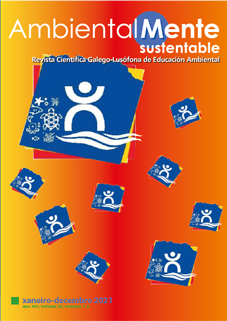O traballo colectivo no contexto das comunidades e Países de Língua Portuguesa: O proceso de tecer a Rede Oceano
DOI:
https://doi.org/10.17979/ams.2021.28.1-2.9453Palabras clave:
Educación ambiental, Educación ambiental mariña e costeira, Lusofonía, Rede OceánicaResumo
Como colectivo pesqueiro que prepara a rede dende a elección dos materiais ata o tecido da súa malla, propoñemos a creación da Rede Oceano: Educación Ambiental en comunidades e países lusófonos. Un espazo que pretende ser unha rede de comunicación democrática, onde se comparte e se integre o coñecemento. Unha iniciativa que se deseña para abarcar todos os países, rexións e comunidades lusófonas, oficialmente ou por identidade lingüística e cultural. Como obxecto de interese común, a Educación Ambiental Mariña e Costeira constitúe un punto de converxencia para os participantes. Nun primeiro momento, a súa proposta presentouse como mesa de diálogo no VI Congreso Internacional de Educación Ambiental nos países e comunidades lusófonas, e agora os seus nodos comezan a entrelazarse para tecer unha rede baseada na comunicación dialóxica no ámbito da Lusofonía.
##plugins.themes.default.displayStats.downloads##
Citas
AMARAL, V. Sem data (s.d.). Conectando pessoas, tecendo redes. [Recuperado em 20 de fevereiro de 2022, de https://silo.tips/download/conectando-pessoas-tecendo-redes].
BAPTISTA, M. M. (2012). Comunicação Intercultural e Lusofonia: a perspectiva da semiótica da cultura. Anuário internacional de comunicação lusófona, p. 11.
CASTELLO, J. P.; &, KRUG, L. C. (Ed.). (2015). Introdução às Ciências do Mar. Pelotas: Editora Textos. [Recuperado em 13 de agosto de 2021, de https://cienciasdomarbrasil.furg.br/images/livros/LivroIntroducaoCienciasDoMar.pdf].
FOREST, L. (1998). Cooperative learning communities: expanding for classroom cocoon to global conections. In: Body, C.M. y N. Davidson. Professional development for cooperative learning. Issues and approaches. New York: State University of New York Press, p. 287-307.
GOVERNO DO ESTADO DO RIO GRANDE DO SUL; SECRETARIA DE POLÍTICAS PARA MULHERES. (2014). Manual para o uso não sexista da linguagem: o que bem se diz bem se entende. Rio Grande do Sul: Secretaria de Comunicação e Inclusão Digital. [Recuperado em 22 de março de 2022, de https://edisciplinas.usp.br/pluginfile.php/3034366/mod_resource/content/1/Manual%20para%20uso%20n%C3%A3o%20sexista%20da%20linguagem.pdf].
GUIMARÃES, Mauro. (2004). A formação de educadores ambientais. São Paulo: Papirus Editora.
ONU, Organização das Nações Unidas. (2017). ONU declara Década da Oceanografia em 2021-2030. [Recuperado em 06 de junho de 2021, de https://nacoesunidas.org/onu-declara-decada-da-oceanografia-em 2021-2030/].
ORELLANA, Isabel. (2005). La estrategia pedagógica de la comunidad de aprendizaje en educación ambiental: aprendiendo a construir un saber-vivir-juntos en un medio de vida compartido. Carpeta informativa CENEAM.
SAUVÉ, Lucie. (2004). Perspectivas curriculares para la formación de formadores en educación ambiental. Carpeta informativa CENEAM, p. 160-162.
UNESCO, Organização das Nações Unidas para a Educação, a Ciência e a Cultura. (2019). UNESCO lança Programa sobre Cultura Oceânica no Brasil. [Recuperado em 25 de março de 2022, de https://www.unesco.org/pt/articles/unesco-lanca-programa-sobre-cultura-oceanica-no-brasil].
WENGER, E. (1998). Communities of practice: Learning, meaning and identity. Cambridge: Cambridge University Press.
Descargas
Publicada
Número
Sección
Licenza
Os traballos publicados nesta revista están baixo unha licenza Creative Commons Recoñecemento-CompartirIgual 4.0 Internacional.
Permitese e anímase aos autores a difundir os artigos aceptados para a súa publicación nos sitios web persoais ou institucionais, antes e despois da súa publicación, sempre que se indique claramente que o traballo pertence a esta revista e se proporcionen os datos bibliográficos completos xunto co acceso ao documento.



